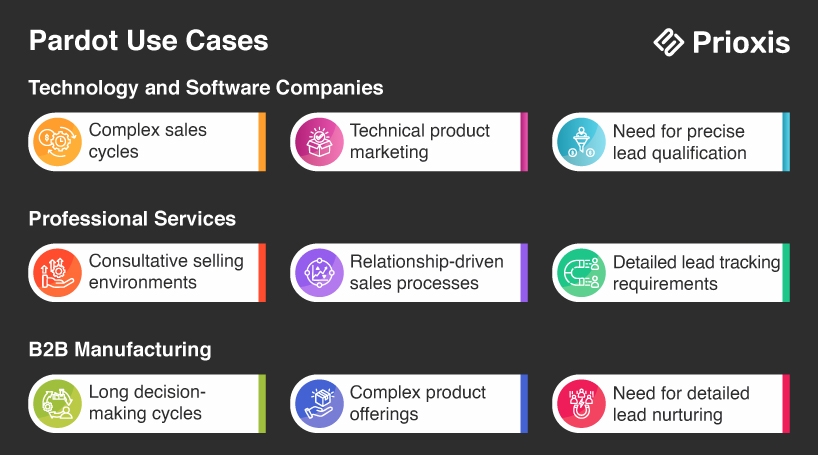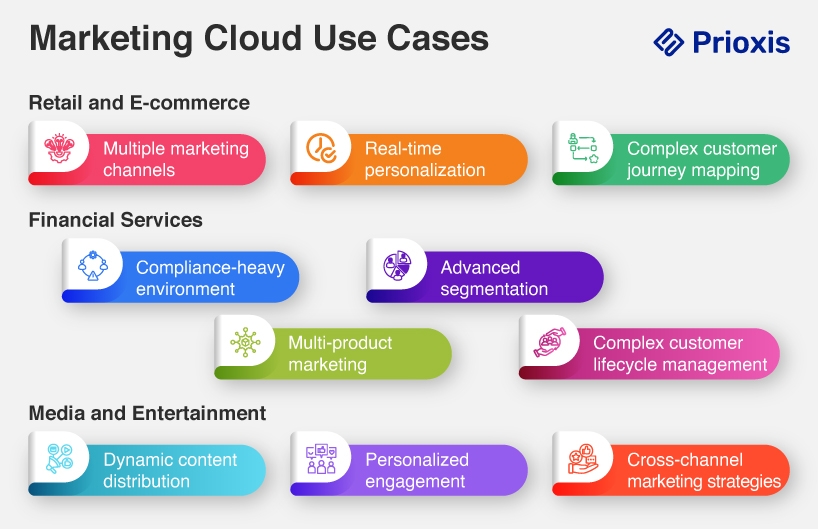Pardot and Salesforce Marketing Cloud are both marketing automation tools owned by Salesforce. In 2022, Salesforce renamed Pardot to "Marketing Cloud Account Engagement" and Salesforce Marketing Cloud to "Marketing Cloud Engagement," which led to some confusion, especially for those unfamiliar with the ecosystem.
Choosing the right marketing automation platform isn’t just about functionality, it’s about aligning your choice with your business goals and strategy. This guide provides a detailed comparison of Pardot and Salesforce Marketing Cloud, helping you understand their unique features and applications so you can make an informed decision that supports your marketing and sales objectives.
Why This Guide Matters
By the end of this guide, you'll have:
- A crystal-clear understanding of both platforms
- A personalized decision matrix
- Actionable insights to make an informed choice
- A roadmap for implementation
Selecting the wrong marketing automation platform can result in:
- Missed revenue opportunities
- Inefficient marketing spends
- Poor customer engagement
- Limited scalability
- Competitive disadvantage
Detailed Platform Breakdown: Beyond Surface-Level Comparisons
| Aspect | Pardot (Account Engagement) | Marketing Cloud |
|---|
| Primary User | B2B Marketing Teams | B2B and B2C Marketing Teams |
| CRM Integration | Native Salesforce CRM | Multiple CRM Platforms |
| Automation Complexity | Moderate | Advanced |
| Personalization Depth | Lead-Focused | Comprehensive Customer Journey |
| Reporting Granularity | Marketing ROI Focused | Predictive and Comprehensive |
Pardot: The B2B Marketing Automation Precision Instrument
What is Pardot (Salesforce Account Engagement)?
Pardot, now officially branded as Salesforce Account Engagement, is a B2B marketing automation platform designed to help businesses manage and track leads throughout the sales process. It provides tools for automating repetitive tasks like email campaigns, monitoring prospect activity, and delivering highly tailored content to engage potential customers at the right stage of their journey.
Pardot is particularly suited for B2B companies with complex sales cycles that require multiple touchpoints and careful lead nurturing. Its deep integration with Salesforce CRM helps align marketing and sales efforts for better collaboration and results.
Pardot focuses on lead management and sales alignment, ensuring that marketing efforts translate into actionable outcomes for sales teams.
Core Capabilities
- Simplifies lead tracking by automating scoring and grading based on engagement levels.
- Provides detailed insights into prospect behavior, allowing for customized outreach and communication.
- Offers analytics that show the ROI of campaigns and where marketing dollars are making the most impact.
Who Benefits Most by Implementing Salesforce Pardot
Pardot is an excellent choice for companies with longer sales cycles, particularly in sectors such as software development, consulting, and manufacturing, where purchase decisions involve multiple stakeholders.
Unique Features
- Lead scoring and grading for prioritizing high-value prospects
- Automated email sequences to engage leads over time
- Integration with Salesforce CRM for seamless sales collaboration
- Tools for creating landing pages and forms to capture prospect data
- Real-time tracking of visitor activity
It is a B2B marketing ecosystem designed with surgical precision. Built specifically for companies with complex sales cycles, it offers:
1. Specialized B2B Lead Generation Capabilities
- Advanced prospect tracking
- Real-time website visitor identification
- Behavior-based lead scoring
- Sophisticated lead qualification mechanisms
- Campaign influence tracking
- Account-based marketing support
2. Engagement Studio: The Automation Powerhouse
- Drag-and-drop campaign builder
- Multi-step nurture programs
- Conditional logic for personalized journeys
- Dynamic content adaptation
3. Integration Ecosystem
- Native Salesforce CRM integration
- Seamless data synchronization
- Custom object mapping
- Real-time lead routing
Technical Specifications
- Platform Type B2B Marketing Automation
- Primary Focus Lead Generation & Nurturing
- Best Suited For Sales-driven organizations
- Integration Depth Salesforce CRM-centric
- Automation Complexity Moderate to High
Marketing Cloud: The Comprehensive Omnichannel Marketing Platform
What is Salesforce Marketing Cloud?
Salesforce Marketing Cloud is a digital marketing platform that helps businesses create, execute, and analyze multi-channel marketing campaigns. It collects customer data from sources like websites, emails, and social media, turning it into actionable insights. Marketing Cloud empowers businesses to deliver personalized communication to their audience, no matter where they are.
Unlike Pardot, which is geared toward B2B sales, Marketing Cloud supports both B2B and B2C strategies, making it versatile for industries like retail, healthcare, and financial services. Its robust suite of tools is designed for businesses aiming to manage customer interactions across several digital platforms.
Salesforce Marketing Cloud supports businesses that need to coordinate marketing campaigns across platforms and deliver cohesive experiences to customers.
Core Capabilities
- Collects data from customer interactions across email, SMS, social media, and web platforms.
- Uses AI tools for audience segmentation and predictive modeling to improve targeting accuracy.
- Automates customer journeys, ensuring consistent communication at every stage of engagement.
Who Benefits Most by Implementing Salesforce Marketing Cloud
This platform is ideal for businesses that want to connect with customers at scale, whether through email campaigns, social media promotions, or mobile notifications. It works well for both transactional and relationship-driven strategies, making it useful for industries like retail, eCommerce, and financial services.
Unique Features
- Journey Builder for automating personalized customer interactions
- Social listening tools to identify trends and customer sentiment
- Predictive analytics for campaign optimization
- Advanced reporting dashboards with real-time data visualization
- Integration with Einstein AI to uncover new marketing opportunities
Architectural Complexity
Marketing Cloud transcends traditional marketing automation, offering a holistic customer engagement platform with unprecedented flexibility.
1. Multichannel Engagement Capabilities
- Email marketing
- Mobile messaging
- Social media marketing
- Advertising integration
- Web personalization
- Customer journey orchestration
- B2B and B2C marketing support
2. Intelligence and Personalization
- Einstein AI-powered insights
- Predictive sending
- Customer segmentation
- Behavior-based personalization
- Advanced analytics and reporting
3. Integration Capabilities
- Multiple CRM integrations
- Third-party data platform connections
- API-driven architecture
- Custom integration possibilities
Technical Specifications
- Platform Type Omnichannel Marketing Automation
- Primary Focus Comprehensive Customer Experience
- Best Suited For Complex, multi-channel marketing strategies
- Integration Depth Extensive, multi-platform
- Automation Complexity High to Advanced

Pardot Use Cases
Technology and Software Companies
- Handling complex B2B sales processes with detailed lead tracking.
- Promoting technical products through precise lead qualification.
- Streamlining campaigns for businesses using Salesforce CRM.
Professional Services
- Managing longer sales cycles with personalized outreach.
- Tracking consultative sales interactions to build trust.
- Automating relationship-focused workflows for consistent follow-ups.
B2B Manufacturing
- Supporting long decision-making processes with tailored lead nurturing.
- Simplifying communication for intricate product offerings.
- Running targeted campaigns to align with specific buyer needs.

Marketing Cloud Use Cases
Retail and E-commerce
- Coordinating customer engagement across multiple channels.
- Designing personalized shopping experiences through customer journey mapping.
- Using automation to reach a large and diverse audience effectively.
Financial Services
- Handling marketing activities in compliance-focused industries.
- Segmenting audiences based on product portfolios and lifecycle stages.
- Running tailored campaigns for multi-product customers.
Media and Entertainment
- Engaging audiences with dynamic, relevant content.
- Building connections across email, social media, and other platforms.
- Designing targeted campaigns to improve loyalty and retention.

Detailed Pricing Analysis: Pardot vs Marketing Cloud
Pardot Pricing Structure (Marketing Cloud Account Engagement)
Growth Tier: $1,250/month
- Up to 10,000 contacts
- Basic email marketing and automation
- Standard lead generation tools
- Essential reporting
Plus Tier: $2,750/month
- Up to 10,000 contacts
- Advanced lead nurturing and personalization
- Enhanced reporting capabilities
- Multitouch and ABM Dashboards
Advanced Tier: $4,400/month
- Up to 10,000 contacts
- AI-powered insights with Einstein
- Advanced attribution modeling
- Business units and developer sandboxes
Premium Tier: $15,000/month
- Up to 75,000 contacts
- Predictive analytics powered by Einstein
- Personalize product support
Salesforce Marketing Cloud Pricing Structure
Pro Edition: Starting at $1,250/month
Corporate Edition: Starting at $4,200/month
- Advanced journey mapping and mobile messaging
- Einstein AI for enhanced segmentation
- Comprehensive analytics
- Unlimited capabilities tailored for enterprise needs
- Sophisticated cross-channel marketing strategies
- Full customization and dedicated support
Implementation Considerations
Pardot Implementation Strategy
Phase 1: Preparation
- Current process audit
- CRM data cleaning
- Integration planning
- Sales team alignment
Phase 2: Configuration
- Lead scoring setup
- Automation rule creation
- Initial campaign development
Phase 3: Training
- Sales and marketing team onboarding
- Workflow optimization
- Continuous learning program
Salesforce Marketing Cloud Implementation Strategy
Phase 1: Discovery
- Comprehensive marketing technology assessment
- Channel strategy development
- Data integration planning
- Cross-functional team alignment
Phase 2: Architecture
- Journey builder configuration
- Advanced segmentation
- AI model training
- Multi-channel integration
Phase 3: Enablement
- Cross-functional team training
- Advanced personalization setup
- Continuous optimization framework
Decision-Making Framework
Evaluation Checklist
Business Objectives
- Short-term marketing goals
- Long-term growth strategy
- Scalability requirements
Technical Infrastructure
- Current marketing technology stack
- Integration capabilities
- IT team's technical expertise
Financial Considerations
- Total cost of ownership
- Expected ROI timeline
- Budget flexibility
Team Capabilities
- Marketing team's technical skills
- Learning curve tolerance
- Resource availability for implementation
Unique Recommendation: Hybrid Approach
For organizations with complex marketing needs, consider a strategic hybrid implementation:
- Utilize Pardot for precise B2B lead generation
- Leverage Marketing Cloud for comprehensive customer engagement
- Create a unified data ecosystem
- Develop cross-platform automation strategies
Key Takeaways
Pardot vs. Salesforce Marketing Cloud
- Pardot is designed to track, nurture, and convert leads in the B2B space, aligning marketing with sales strategies.
- Marketing Cloud focuses on connecting with customers through multi-channel campaigns, making it suitable for both B2B and B2C.
Use Case Comparison
- Use Pardot if your goal is B2B lead generation and sales cycle management.
- Go for Marketing Cloud if you require multi-channel engagement and need tools to execute campaigns at scale.
Both platforms cater to different needs and excel in their respective focus areas. Businesses with longer sales cycles and a need for lead nurturing will find Pardot to be the right fit. Those looking to manage customer interactions across various platforms and create unified messaging should consider Marketing Cloud.
Conclusion: Your Strategic Marketing Transformation
Choosing between Salesforce Marketing Cloud and Pardot is about aligning technology with your unique business vision. Each platform offers distinct advantages, and your decision should reflect your specific marketing ecosystem.
As consultants specializing in both Account Engagement and Marketing Cloud Engagement, we work with these platforms daily. If you need assistance with implementation or ongoing use, feel free to reach out to us.
Here are the Immediate Next Steps You can Follow
- Schedule personalized platform demonstrations
- Conduct internal marketing technology assessment
- Consult with Salesforce implementation experts



